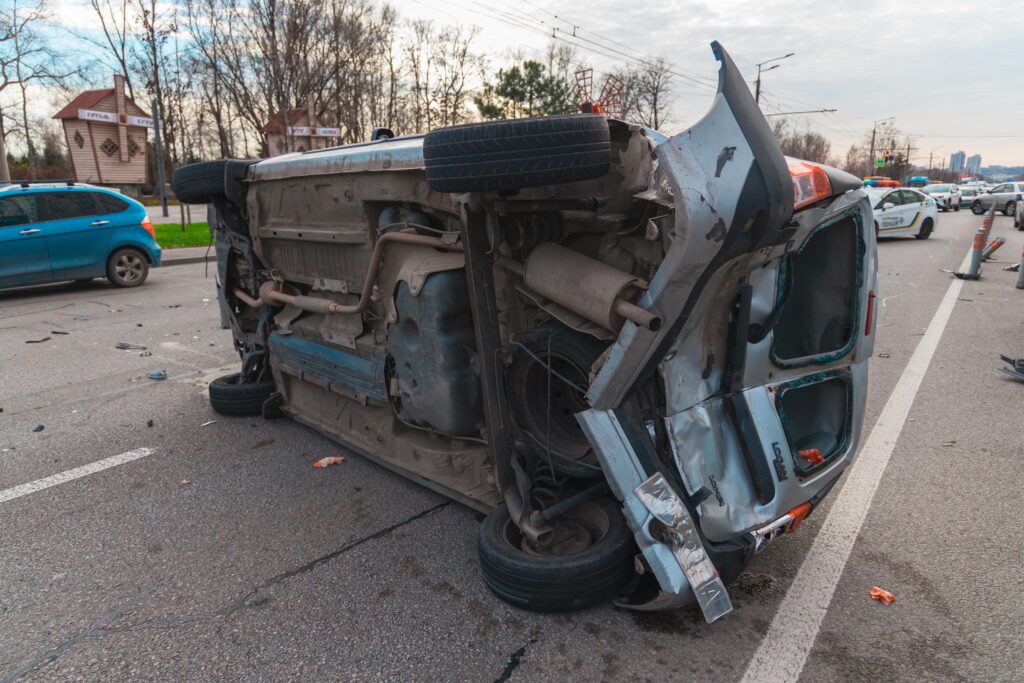After a trucking accident black box data provides vital information about the truck’s speed, braking, and mechanical performance before the crash. This data helps determine the cause of the accident. It can also reveal truck driver errors – such as speeding or fatigue – or mechanical failures, which can support your claim or lawsuit and increase your chances of receiving fair compensation.
If you suffered injuries in a commercial trucking accident resulting from a negligent truck driver or trucking company, you may recover financial compensation. A knowledgeable Edmonton truck accident lawyer can review the circumstances of your accident with you, obtain black box data from the truck, and use that evidence to prove the legal elements of your case.
Your lawyer can also aggressively negotiate with insurance company adjusters – or litigate your case in court – to maximize your total compensation.
Common Truck Accident Causes and Locations
Truck accidents often happen because of mistakes or careless actions by truck drivers or trucking companies.
These accidents can cause serious injuries or even death, so you need a lawyer who understands the common reasons they occur, where they happen, and the types of accidents that happen most often.
- One of the most common causes of truck accidents is driver fatigue. Truck drivers often have long hours on the road, and if they don’t take enough breaks, they can become tired and lose focus. Fatigue slows reaction time and makes it harder for drivers to make quick decisions.
- Truck drivers also sometimes cause accidents because of distracted driving, which can involve texting, using GPS devices, eating, or talking on the phone. When a driver’s attention isn’t fully on the road, they may miss important signals or changes in traffic.
- Speeding is another major cause of truck accidents. When drivers exceed the speed limit or drive too fast for road conditions, they have less time to stop – especially in large trucks that take longer to slow down.
- Impaired driving is also a serious issue. Some truck drivers may use alcohol or drugs to stay awake, but this can significantly degrade their ability to drive safely.

Trucking companies can also be at fault when they don’t properly maintain their vehicles. Poor maintenance of brakes, tires, or lights can make it harder for trucks to stop or be seen. Trucking companies also sometimes overload trucks or fail to properly secure cargo, leading to rollovers or jackknife accidents.
When it comes to common locations, truck accidents often happen on highways and interstates, where trucks travel at higher speeds and make long trips. Busy intersections, construction zones, and urban areas with heavy traffic also see frequent accidents.
Some of the most common types of truck accidents include rear-end collisions, where a truck crashes into the back of another vehicle, and side-impact crashes, where a truck hits a car from the side, often when turning. Rollovers are another common accident type, especially when truck drivers take sharp turns or drive on curvy roads too quickly.
These accidents can have devastating consequences for drivers, passengers, and pedestrians alike.
Injuries in Truck Accident Cases
Truck accidents can cause severe injuries due to the size and weight of the vehicles involved.
Victims often experience both physical and mental injuries that can affect their lives for a long time.
- One of the most common physical injuries in a truck accident is whiplash. This happens when the neck moves quickly back and forth, causing damage to the muscles and ligaments. Victims may feel pain and stiffness and have trouble moving their necks.
- Another frequent injury is broken bones. The force of a truck collision can easily cause fractures in the arms, legs, ribs, and even the spine. Some of these fractures may require surgery and take months to heal.
- Head injuries, such as concussions or traumatic brain injuries (TBIs), are also common in truck collisions. These occur when the head hits an object, like the steering wheel or dashboard, or when the brain is shaken inside the skull. Brain injuries can range from headaches or concussions to severe TBIs, which can affect memory, concentration, and motor skills. In some cases, victims may need rehabilitation and long-term medical care to recover from these injuries.
- Spinal cord injuries are among the most serious injuries in a truck accident. These can result in paralysis, either partial or complete, depending on where the spinal cord is damaged. Paralysis can change a person’s entire life, requiring extensive treatment and adaptation to new living conditions.
- Internal injuries are another danger in truck accidents. The force of the collision can damage organs like the liver, lungs, or kidneys, leading to internal bleeding. These injuries may not appear right away, but they can kill you and require immediate medical care.

In addition to physical injuries, truck accident victims can suffer from mental injuries as well. Many individuals experience post-traumatic stress disorder (PTSD), where they relive the crash in nightmares or flashbacks. This can make it hard for them to return to normal life or even get back behind the wheel.
A traumatic event like a truck collision can also cause depression and anxiety. Victims may feel overwhelmed with their injuries, financial stress, or the loss of a loved one in the crash.
Ways That Black Box Data Can Help You Prove Your Truck Accident Case
In truck accident claims and lawsuits, black box data plays a critical role in proving liability and determining the cause of the crash. A truck’s black box, officially known as the Electronic Control Module (ECM) or Event Data Recorder (EDR), records essential information about the truck’s operation before, during, and after a truck collision.
This data can establish fault and help hold the responsible party or parties accountable.
- One of the most important uses of black box data is proving speed at the time of the accident. The ECM records how fast the truck was travelling immediately before the crash, which can help determine if the driver was speeding or failed to slow down in time. Speeding is a common factor in truck accidents, and this data can show whether the driver exceeded the speed limit or drove too fast for road conditions, making them more likely to be at fault.
- Black box data also captures braking patterns. The ECM records when the brakes were applied and the force of the braking. This can help prove whether the driver reacted too late to a hazard or a mechanical failure with the braking system caused the crash. If the driver fails to brake in time, it may indicate distracted driving or driver fatigue, which are key causes of truck accidents.
- In addition, black box data can reveal engine performance and mechanical issues. The ECM tracks the truck’s engine status, including RPMs, throttle position, and any mechanical problems that may have contributed to the accident. For example, if the truck’s brakes were not functioning properly or the engine was overheating, the data may show that the trucking company failed to maintain the vehicle, leading to the crash.
- The ECM also logs hours-of-service data, which can help prove driver fatigue. Regulations frequently limit the number of hours a truck driver can be on the road without taking a break. Black box data can show how long the driver had operated the truck before the accident, helping to establish whether an overworked driver was fatigued.
- Lastly, black box data is major for reconstructing the accident. It can provide a detailed timeline of the truck’s movements, speed changes, and any sudden maneuvers leading up to the crash. This data, when combined with witness statements, video footage, and police reports, can help paint a clear picture of what happened, making it easier to assign fault and build a strong case in favour of the accident victim.
Deciding Whether to Settle or Litigate a Truck Accident Case
Deciding whether to settle or litigate a truck accident case can affect the outcome of your claim. Both options have their advantages and drawbacks, so carefully weigh them based on your case.
Settling a case means reaching an agreement with the other party – usually through their insurance company – without going to court. One of the main benefits of settling is speed. Litigation can take time, while settlements often conclude more quickly.

Settling can also be less stressful since you avoid the courtroom process, including giving testimony or being cross-examined. Additionally, settling provides certainty. When you settle, you agree to a specific amount of compensation, and there is no risk of losing in court and getting nothing.
However, settling may also have downsides. In some cases, the settlement offer may be lower than what you may potentially win in court. Insurance companies often try to minimize payouts, and their first offer is usually not the best.
You’ll need to determine if the offer adequately covers your lost income, pain and suffering, and other damages.
If you accept a settlement, you waive the right to pursue any further legal action regarding the accident, so consult a truck accident lawyer to ensure you received a fair offer before accepting.
On the other hand, litigating a truck accident case involves taking it to court, where a jury usually decides the outcome.
One main reason to pursue litigation is the potential for a larger award. If the accident severely injured you and the insurance company offered a low settlement, litigation can result in a higher payout to fully compensate you for your losses. Additionally, You may need to resort to litigation if the other party refuses to accept responsibility or your case involves complex legal issues.
However, litigation presents challenges. It can take time and money, often requiring court costs and expert witness fees. There’s also the risk of an unpredictable outcome – you may win a larger amount than the settlement offer, or you may receive less or nothing at all.
Ultimately, the decision to settle or litigate depends on factors like the severity of your injuries, the fairness of the settlement offer, and your willingness to go through a potentially lengthy court process. An experienced truck accident lawyer can help you make the best decision for your case and circumstances.
How Much Money Can I Get for a Truck Accident Case?
When involved in a truck accident, the amount of compensation you can receive depends on several factors, including the severity of your injuries, the effects on your life, and the level of negligence involved. The compensation you can recover fall into two main categories: economic and non-economic damages.
Economic damages refer to tangible losses you’ve suffered due to the accident. One key area of these damages is for lost income. If the injuries from the truck accident prevent you from working, either temporarily or permanently, you can recover compensation for the income you’ve missed.
In cases where injuries result in long-term or permanent disability, you may recover compensation for your loss of earning capacity. This covers future earnings you won’t earn because of your inability to perform the same job – or any job.
Non-economic damages, on the other hand, compensate for more subjective losses, which are harder to quantify but still impactful.
One common non-economic damage is pain and suffering. This compensates you for the physical pain, discomfort, and emotional distress you endured because of the accident and your injuries. Severe truck accidents can result in long-term or chronic pain, making this compensation necessary for your recovery.

You may also recover emotional distress compensation. Truck accident victims often experience anxiety, depression, or post-traumatic stress disorder (PTSD). These mental health effects can interfere with your daily life and relationships, making emotional distress compensation important.
In certain cases, especially where the truck driver or company acted with extreme recklessness or intent, you may receive punitive damages. These do not compensate for a specific loss but punish the responsible party for their conduct and deter similar behaviour.
Overall, the total amount of compensation varies based on your case, but by seeking the right damages, you can recover fair compensation for the physical, emotional, and financial toll of the truck accident.
Speak with an Experienced Truck Accident Lawyer Today
If you sustained injuries in a commercial trucking accident that a negligent truck driver or trucking company caused, you may recover compensation.
A skilled Edmonton personal injury lawyer can obtain information from the truck’s black box and use that information to prove the legal elements of your case. Your lawyer will also represent you during all legal proceedings and work to maximize your overall compensation award.
